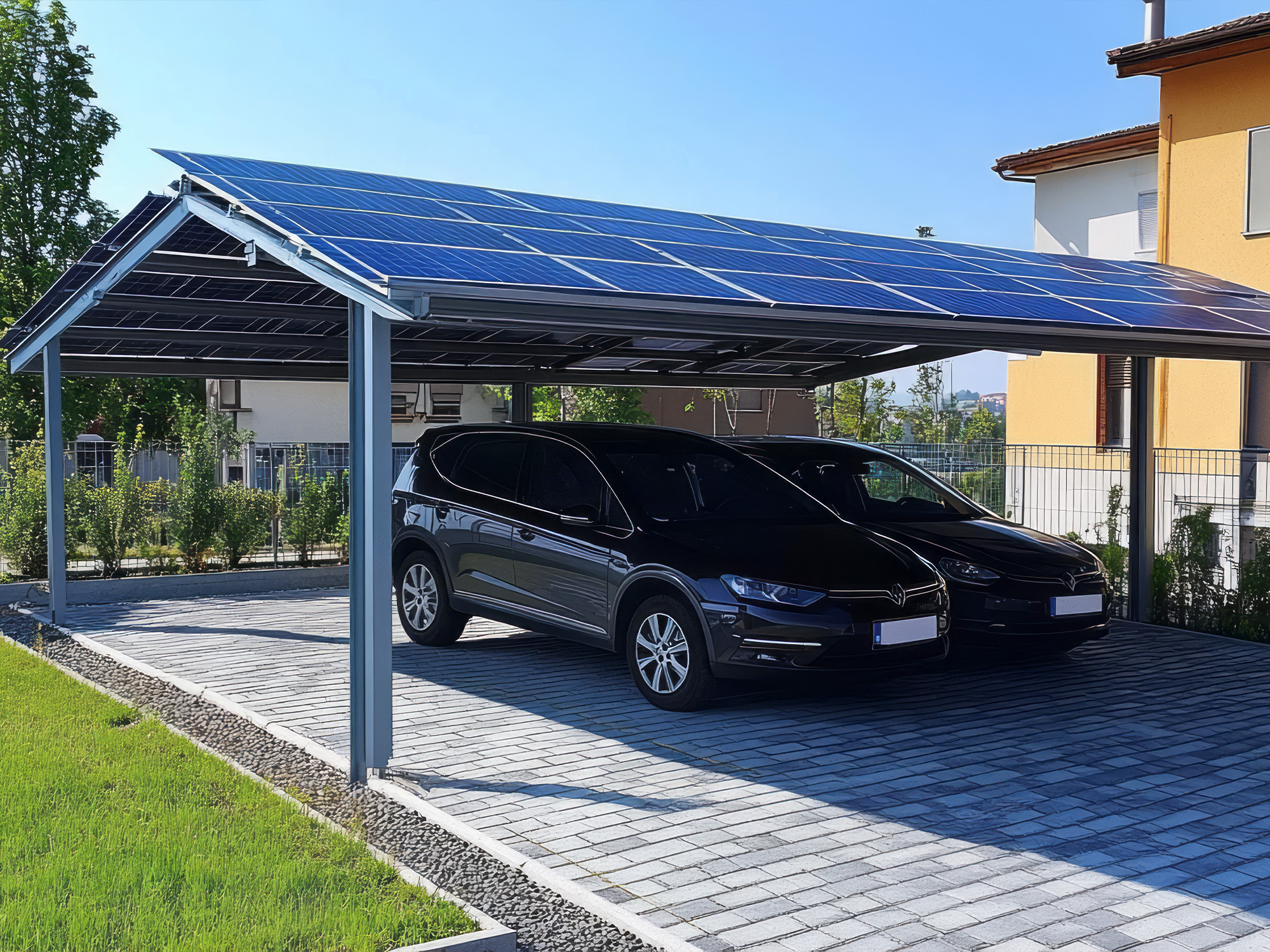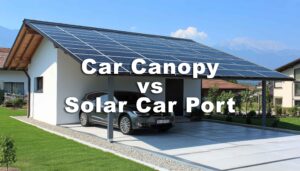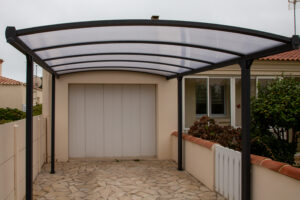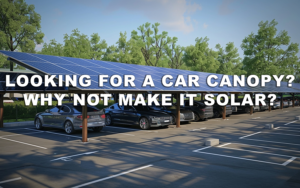As solar power continues to evolve and become more accessible, solar carports have emerged as an innovative solution to combine energy generation with practical infrastructure. Whether you’re an individual homeowner or a commercial business, solar carports offer a unique way to maximize the use of space, reduce energy costs, and move towards a more sustainable future. This guide explores why solar carports are a worthwhile investment, their financial benefits, environmental impacts, and how they compare to traditional rooftop solar systems.
What Is a Solar Carport?
A solar carport is a structure that provides covered parking while generating solar energy. Unlike traditional carports, solar carports are equipped with photovoltaic (PV) panels on their roofs, allowing them to convert sunlight into electricity. This solution is particularly effective in urban environments or places where rooftop installations may not be feasible.
Solar carports can be installed in a variety of settings, from residential driveways to large-scale commercial parking lots. They also offer flexibility in terms of design, with single-bay carports for individual households or multi-bay setups for businesses and public institutions.
Financial Benefits of Solar Carports
1. Reduction in Electricity Bills
Solar carports generate clean, renewable energy that can be used to power homes, businesses, or even electric vehicle (EV) charging stations. By offsetting traditional electricity use, users can significantly reduce their energy bills. In many cases, surplus energy generated by the carport can be fed back into the grid, allowing users to earn credits through net metering programs.
2. Tax Incentives and Rebates
Governments around the world are encouraging the adoption of solar power through tax credits, rebates, and other financial incentives. In the United States, for example, the federal solar Investment Tax Credit (ITC) offers a 30% credit on the cost of installing a solar system, including solar carports. State-level incentives and grants, such as Solar Renewable Energy Certificates (SRECs), further increase the financial viability of solar carports.
3. Increased Property Value
Solar installations, including carports, are known to increase the value of a property. For commercial properties, solar carports provide an attractive feature that appeals to eco-conscious consumers, tenants, and clients, driving demand and potentially increasing revenue. Residential properties can also benefit, as homes with solar power systems are often sold at a premium compared to those without.
4. Long-Term Savings
While the initial cost of installing a solar carport can be substantial, the long-term savings on electricity, combined with the durability of solar technology, make it a wise investment. Solar panels typically come with a 25-year warranty, and many systems can function efficiently for 30 years or more. Over time, the energy savings and potential income from selling excess energy can outweigh the upfront costs.
Environmental Impact of Solar Carports
Solar carports offer significant environmental benefits, helping to reduce reliance on fossil fuels and combat climate change. By harnessing the power of the sun, they reduce greenhouse gas emissions and air pollution associated with traditional energy sources. Additionally, they help mitigate urban heat island effects by providing shaded parking spaces that keep vehicles cooler.
Here are some specific environmental advantages:
- Reduction in Carbon Footprint: Solar energy is a clean, renewable source of power that reduces carbon dioxide (CO2) emissions. A typical solar carport system can offset several tons of CO2 each year, contributing to a reduction in global greenhouse gas emissions.
- Mitigating Urban Heat Islands: Solar carports provide shade, reducing the heat absorption from paved surfaces like parking lots. This not only makes parking more comfortable but also decreases the overall temperature in urban areas, which tend to trap heat.
- Sustainability in Transportation: With the rise of electric vehicles, solar carports with integrated EV charging stations can provide clean, renewable energy to power transportation, further reducing reliance on fossil fuels.
Comparison: Solar Carports vs. Rooftop Solar
1. Space Efficiency
One of the primary benefits of solar carports is their ability to make efficient use of available space. Rooftop solar requires a structurally sound, unobstructed roof to install panels. Many properties lack suitable roofs due to shading, age, or structural limitations. Solar carports solve this issue by utilizing parking areas, which are often underused.
2. Maintenance and Accessibility
Solar carports are easier to access for cleaning, maintenance, and repairs compared to rooftop systems, where safety concerns and height can complicate servicing. With solar carports, panels are mounted on a frame at ground level or slightly elevated, making them more accessible.
3. Design and Aesthetics
Solar carports provide greater flexibility in design. They can be customized to match the aesthetic of the property, unlike rooftop solar panels, which are limited by the dimensions and design of the roof. This makes solar carports an attractive option for properties where aesthetics are a concern.
4. Capacity for Energy Generation
In many cases, solar carports can support more solar panels than rooftops. This is especially true for commercial properties with large parking lots. Solar carports also have the added advantage of being orientable for optimal sun exposure, while rooftops may have fixed orientations that limit solar efficiency.
Is a Solar Carport Worth the Investment?
Solar carports offer a compelling combination of environmental and financial benefits, making them an excellent long-term investment. For property owners with space constraints, high electricity costs, or a desire to go green, solar carports provide a versatile solution that can lower energy bills, reduce carbon footprints, and increase property values.
While the initial cost of installation may be higher than rooftop solar in some cases, the additional benefits—such as the dual-purpose nature of providing both energy and shade, as well as government incentives—make them a competitive option. Businesses, in particular, can benefit from the visibility and eco-friendly branding that comes with solar carports, enhancing their public image while also saving money.
Potential Challenges of Solar Carports
1. Higher Initial Costs
The primary drawback of solar carports is the higher installation cost compared to rooftop systems. Carport structures need to be built specifically to support the solar panels, which adds to the overall expense. However, many financial incentives can offset these costs, making solar carports an economically viable option over time.
2. Space Requirements
While solar carports make efficient use of parking lots, they do require a sizable amount of space. Residential properties with limited parking areas may not find solar carports feasible, while commercial properties with expansive lots can benefit from large-scale installations.
3. Complex Installation Process
Building a solar carport can be more complex than installing rooftop solar panels, particularly for larger commercial projects. It requires professional design and engineering, which can add to the lead time and initial costs.
Conclusion
Solar carports are an innovative, eco-friendly, and cost-efficient solution that combines energy generation with practical infrastructure. From reducing energy bills to increasing property value and providing clean energy for electric vehicles, solar carports are a strategic investment for both residential and commercial properties. Despite the higher initial costs, the long-term financial and environmental benefits make solar carports a smart choice for those looking to contribute to a sustainable future.




